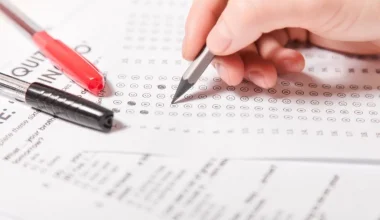Getting a second chance to improve one’s GCSE results can be crucial for students seeking better academic prospects. However, before embarking on this journey, it is essential to consider the financial implications of re-sitting these exams.
Understanding how much it costs to re-sit a GCSE allows students and their families to plan their finances accordingly and sheds light on the accessibility of this option for those who may be financially challenged.
This article will answer ‘How Much Does it Cost to Re-sit a GCSE?’ and provide relevant information about resitting for a GCSE.
Table of contents
- Who may re-sit a GCSE exam?
- How Long Does it Take to Resit for GSCE?
- How Can I Study for a GCSE Resit?
- How many times can you retake your GCSEs?
- How Much Does it Cost to Re-sit a GCSE?
- Factors Influencing Re-sit Costs
- How To Find Financial Aid and Support
- FAQs about Re-sit GCSE Exams
- Conclusion
- References
- Recommendations
Why Re-sit Your GCSEs?
Retaking your GCSEs may not be the path you initially envisioned, but it can open doors to a brighter future. Firstly, retaking allows you to improve your grades and showcase your abilities. We all have bad days or periods of struggle and retaking proves we can achieve better results.
Furthermore, a higher grade can significantly impact your career prospects, particularly if you aspire to study at top universities or secure competitive job opportunities.
Moreover, retaking your GCSEs offers an opportunity for personal growth and development. It enables you to refine essential skills such as time management and perseverance in facing challenges.
By understanding the areas where you fell short initially, you can work on strengthening those weak points and ultimately become a more well-rounded individual.
Retaking exams is about gaining higher scores and demonstrating resilience, determination, and willingness to learn from past mistakes.
Ultimately, retaking your GCSEs shows commitment and dedication towards self-improvement.
It demonstrates that setbacks will not hinder your progress but instead serve as stepping stones toward success.
What Are the Benefits of Resitting for Your GCSEs?
To resit for GCSE comes with various benefits. Some of them include:
Improved Grades: Resitting allows you to aim for higher grades, enhancing your academic record and opening doors to better educational and career opportunities.
University and College Entry: Many higher education institutions have specific GCSE grade requirements for admission. By resitting and achieving better grades, you increase your chances of being accepted into the university or college of your choice.
Subject Mastery: Resitting allows you to focus on subjects you found challenging the first time. This can lead to a deeper understanding and mastery of those subjects, which can be valuable for further studies and career pursuits.
Career Prospects: Some employers consider GCSE results when making hiring decisions. Improved grades through resitting can enhance your resume and make you a more competitive candidate in the job market.
Personal Development: Resitting involves revisiting and reinforcing your understanding of subjects. This process fosters self-discipline, time management, and resilience, skills valuable in academics and various aspects of life.
Read ALSO: GCSE Grade Boundaries Explained | 2024 Expert Tips
Who may re-sit a GCSE exam?
There are no obstacles to taking your GCSEs, and no additional credentials or other entry criteria apply. Anyone and for whatever reason may decide to retake their GCSEs.
No matter your age—whether you’re 17 or 77—you can retake your GCSEs if you want to raise your scores and learn more about a subject.
How Long Does it Take to Resit for GSCE?
The answer to this query is specific to you and your situation. The course information is still fresh in your mind if you just finished taking your GCSEs and want to retake them.
In other words, you won’t need to spend as much time studying as a person in their fifties who hasn’t looked at the course materials since they were sixteen.
Others who retake examinations after recently failing them need a few months to review the information and accomplish their objectives.
Many students need considerably more time to re-examine the course material and allow a whole year to study. Suppose you are taking classes with the same teacher and in the same setting.
In that case, this will be simpler: Making sure the new supplier can support the same awarding body and standard is crucial if you are switching providers so that your earlier training and preparation are not wasted.
How Can I Study for a GCSE Resit?
Don’t be discouraged if you find yourself in a position where you have to resit your GCSE exams. This is an opportunity for growth and improvement.
Create a structured study plan tailored to your needs to ensure success on your resits. Identify the areas that require the most attention and allocate dedicated time to review and practice them.
One effective technique to enhance your studying is active learning. Instead of passively reading through textbooks or notes, actively engage with the material by summarising key points in your own words or creating flashcards for essential concepts.
Additionally, seeking support from teachers or tutors can provide valuable insights and guidance during revision.
Maintaining a positive mindset is crucial when preparing for a GCSE resit. Remember that setbacks are part of life’s journey; this experience will only make you stronger in the long run. Emphasise self-care during this intense study period by getting enough sleep, eating well-balanced meals, taking breaks regularly, and engaging in activities that help reduce stress, such as exercise or meditation.
By implementing these strategies alongside hard work and determination, you can effectively prepare for your GCSE resit and achieve the desired results.
Stay motivated throughout the process and envision how accomplishing this goal will open doors to future opportunities and success in education and beyond!
Read Also: IGCSE vs GCSE: Which is Harder and Why?
How many times can you retake your GCSEs?
When it comes to retaking GCSEs, the adage that if at first you don’t succeed, try again rings true. Unlike A-level exams, which have a limit on the number of times they can be retaken, there is no specific restriction on how many times you can retake your GCSEs.
If you’re unsatisfied with your grades or feel you could have done better, give it another shot.
However, before diving headfirst into multiple resits, it’s essential to consider a few things. Firstly, taking GCSE exams can be mentally and emotionally taxing.
Repeatedly sitting through exams and revising for extended periods may impact your motivation and overall well-being.
Additionally, retakes often involve additional costs such as exam fees and study materials. Assessing your commitment level and ensuring you have enough resources before deciding to go down this path is vital.
While retaking might seem logical for those seeking improvement opportunities or aiming for specific university requirements or career paths, it’s worth remembering that exam results are not the sole determinant of success in life.
Many individuals successfully pursue alternative routes, such as vocational courses or apprenticeships, based heavily on their GCSE results.
Ultimately, what matters most in any educational journey is personal growth and finding a path that aligns with one’s interests and aspirations rather than fixating solely on numerical grades.
Read ALSO: What GCSEs Do You Need to Become a Doctor in 2024?
How Much Does it Cost to Re-sit a GCSE?
Your age, the topic you are retaking, and the location you select will all impact how much you will pay to repeat your GCSEs.
You may qualify to return to school and pursue these credentials for free if you are between 16 and 18 and did not earn a grade 4 or above in either English or math (or both) for your GCSEs.
If you are over 16 and have completed your formal schooling but have not yet earned a grade of 4 or higher in English or mathematics, you can take these courses for free at a nearby learning facility. To talk about your possibilities, get in touch with the nearby learning center.
Outside of these essential topics, you should prepare to pay if you wish to retake a GCSE. You must pay both course costs and exam fees to retake your GCSEs.
Exam fees cover the cost of reserving an exam space and are paid directly to the exam center, whereas course fees cover your tuition and course materials and are paid to the college where you study.
If you decide to attend a physical college, you must budget upwards of £1,000 for each subject. Online courses are typically far more flexible and economical; depending on the subject, you may enroll in an online course with a one-on-one teacher and the freedom to work at your speed for as little as £275, with enrolling costs starting at £30.
Read Also: Do You Get UCAS Points for GCSEs?
Factors Influencing Re-sit Costs
Several factors influence the cost of re-sitting a GCSE exam:
1. Number of Subjects:
The cost will vary depending on the number of subjects you choose to re-sit. Typically, a student re-sits subjects individually, which means the cost accumulates per subject.
2. Examination Board:
Different examination boards may have varying fee structures. Be sure to research the specific fees associated with the examination board relevant to your chosen subjects.
3. Educational Institution:
The institution where you plan to re-sit your GCSE exams can impact the cost. Private institutions may have higher fees compared to public schools.
4. Location:
The cost can also vary based on your geographical location. Costs in urban areas might differ from those in rural regions.
5. Additional Resources:
Some institutions offer study materials, resources, or extra support as part of the re-sit package, which can influence the overall cost.
How To Find Financial Aid and Support
Worried about covering the re-sit costs? There are options available to help alleviate the financial burden:
1. Government Funding:
In certain cases, government funding may be available to assist with re-sit costs. Eligibility criteria and application processes can vary, so check with relevant authorities.
2. Educational Institutions:
Some schools or colleges offer financial support or scholarships to students facing financial constraints. Inquire about these options at your institution.
3. Online Resources:
Numerous online platforms provide free or low-cost study materials, making it more affordable to prepare for re-sits.
4. Part-time Work:
Consider taking up a part-time job to fund your re-sit exams. Balancing work and studies can be challenging, but it’s a viable option for many.
Read ALSO: What GCSEs Do You Need To Become A Lawyer In 2024?
FAQs about Re-sit GCSE Exams
Some examination boards offer online re-sit options, allowing you to take the exam remotely. However, ensure you have a reliable internet connection and a suitable environment.
Yes, you can re-sit a GCSE exam even if you previously passed. Re-sitting offers a chance to improve your grade and potentially open up better opportunities.
Re-sit exams are not inherently harder, but they do require focused preparation. Use your previous experience to identify areas for improvement.
Yes, you can re-sit exams multiple times. However, there might be limitations on the number of attempts, so it’s advisable to plan your re-sits strategically.
Conclusion
Re-sitting a GCSE exam can be a stepping stone toward a brighter academic future. While costs can vary based on several factors, financial aid options are available to support your efforts.
By understanding the influencing factors and seeking assistance, you can confidently embark on your re-sit journey.
Remember, re-sits offer a chance for improvement and growth, so approach them with optimism and determination.






